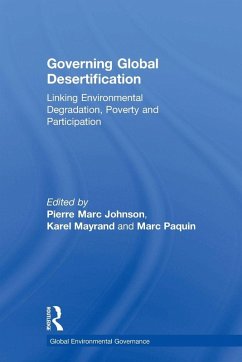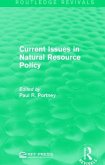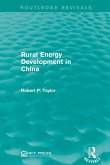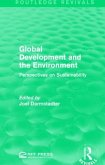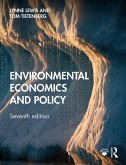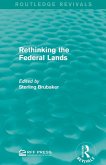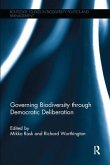Pierre Marc JohnsonLinking Environmental Degradation, Poverty and Participation
Governing Global Desertification
Linking Environmental Degradation, Poverty and Participation
Herausgeber: Mayrand, Karel
Pierre Marc JohnsonLinking Environmental Degradation, Poverty and Participation
Governing Global Desertification
Linking Environmental Degradation, Poverty and Participation
Herausgeber: Mayrand, Karel
- Broschiertes Buch
- Merkliste
- Auf die Merkliste
- Bewerten Bewerten
- Teilen
- Produkt teilen
- Produkterinnerung
- Produkterinnerung
This volume examines the United Nations Convention to Combat Desertification (UNCCD) signed in 1994. It studies the links between land degradation and poverty, the role of civil society and good governance in implementing the UNCCD and the various approaches to fighting desertification.
Andere Kunden interessierten sich auch für
![Current Issues in Natural Resource Policy Current Issues in Natural Resource Policy]() Current Issues in Natural Resource Policy55,99 €
Current Issues in Natural Resource Policy55,99 €![Resource and Environmental Effects of U.S. Agriculture Resource and Environmental Effects of U.S. Agriculture]() Pierre R CrossonResource and Environmental Effects of U.S. Agriculture34,99 €
Pierre R CrossonResource and Environmental Effects of U.S. Agriculture34,99 €![Rural Energy Development in China Rural Energy Development in China]() Robert P TaylorRural Energy Development in China56,99 €
Robert P TaylorRural Energy Development in China56,99 €![Global Development and the Environment Global Development and the Environment]() Global Development and the Environment34,99 €
Global Development and the Environment34,99 €![Environmental Economics and Policy Environmental Economics and Policy]() Lynne LewisEnvironmental Economics and Policy127,99 €
Lynne LewisEnvironmental Economics and Policy127,99 €![Rethinking the Federal Lands Rethinking the Federal Lands]() Rethinking the Federal Lands38,99 €
Rethinking the Federal Lands38,99 €![Governing Biodiversity through Democratic Deliberation Governing Biodiversity through Democratic Deliberation]() Governing Biodiversity through Democratic Deliberation81,99 €
Governing Biodiversity through Democratic Deliberation81,99 €-
-
-
This volume examines the United Nations Convention to Combat Desertification (UNCCD) signed in 1994. It studies the links between land degradation and poverty, the role of civil society and good governance in implementing the UNCCD and the various approaches to fighting desertification.
Hinweis: Dieser Artikel kann nur an eine deutsche Lieferadresse ausgeliefert werden.
Hinweis: Dieser Artikel kann nur an eine deutsche Lieferadresse ausgeliefert werden.
Produktdetails
- Produktdetails
- Verlag: Taylor & Francis
- Seitenzahl: 312
- Erscheinungstermin: 22. Dezember 2016
- Englisch
- Abmessung: 234mm x 156mm x 17mm
- Gewicht: 440g
- ISBN-13: 9781138278127
- ISBN-10: 1138278122
- Artikelnr.: 57042245
- Herstellerkennzeichnung
- Libri GmbH
- Europaallee 1
- 36244 Bad Hersfeld
- gpsr@libri.de
- Verlag: Taylor & Francis
- Seitenzahl: 312
- Erscheinungstermin: 22. Dezember 2016
- Englisch
- Abmessung: 234mm x 156mm x 17mm
- Gewicht: 440g
- ISBN-13: 9781138278127
- ISBN-10: 1138278122
- Artikelnr.: 57042245
- Herstellerkennzeichnung
- Libri GmbH
- Europaallee 1
- 36244 Bad Hersfeld
- gpsr@libri.de
Dr Pierre Marc Johnson has been counsel to Heenan Blaikie, Canada, since 1996. He is advisor to various international institutions, including the Commission for Environmental Cooperation (NAFTA parallel institution) and the UNCCD Secretariat. He has also chaired Committees of the Conference of Parties of the UNCCD and has mediated Convention related issues between OECD and developing countries in the last decade. Karel Mayrand is co-founder and Director of Research at Unisféra International Centre, Canada - an independent, not-for-profit research centre on sustainable development policy and law. He also lectures on environment and international development issues at the Université de Sherbrooke, Canada. His fields of expertise are trade policy and the environment, agricultural policies, rural development and desertification. Marc Paquin is a lawyer and MBA specializing in international and comparative environment and sustainable development law and policy. He is the co-founder and Executive Director of Unisféra International Centre, Canada and is also a lecturer at the Université de Sherbrooke, Canada. Throughout his career Mr Paquin has worked on various assignments for governments, intergovernmental organizations and the private sector.
Contents: Preface; The United Nations Convention to combat desertification in global sustainable development governance
Pierre Marc Johnson
Karel Mayrand
and Marc Paquin; The scientific basis: links between land degradation
drought and desertification
Stefanie M Herrmann and Charles F. Hutchinson; Examining the links between poverty and land degradation: from blaming the poor towards recognising the rights of the poor
Sally-Anne Way; Desertification and migration
Michelle Leighton; Negotiating desertification
Adil Najam; The United Nations and the fight against desertification: what role for the UNCCD Secretariat?
Steffen Bauer; Civil society's role in negotiating and implementing the UNCCD
Friederike Knabe; Promoting good governance through the implementation of the UNCCD
Lene Poulsen and Masse Lo; The global mechanism and UNCCD financing: constraints and opportunities
Francois Falloux
Suzanne Tressler
and Karel Mayrand; Decentralisation and sustainable resources management in West Africa: a line of action for revisiting national action programmes
Richard Pearce; Knowledge and the UNCCD: The community exchange and training programme
Noel Oettle; Agriculture
trade
and desertification: implications for UNCCD
Karel Mayrand and Marc Paquin; Conclusion: the UNCCD at a crossroad
Pierre Marc Johnson
Karel Mayrand
and Marc Paquin; Appendix: United Nations convention to combat desertification in those countries experiencing serious drought and/or desertification
particularly in Africa; Bibliography; Index.
Pierre Marc Johnson
Karel Mayrand
and Marc Paquin; The scientific basis: links between land degradation
drought and desertification
Stefanie M Herrmann and Charles F. Hutchinson; Examining the links between poverty and land degradation: from blaming the poor towards recognising the rights of the poor
Sally-Anne Way; Desertification and migration
Michelle Leighton; Negotiating desertification
Adil Najam; The United Nations and the fight against desertification: what role for the UNCCD Secretariat?
Steffen Bauer; Civil society's role in negotiating and implementing the UNCCD
Friederike Knabe; Promoting good governance through the implementation of the UNCCD
Lene Poulsen and Masse Lo; The global mechanism and UNCCD financing: constraints and opportunities
Francois Falloux
Suzanne Tressler
and Karel Mayrand; Decentralisation and sustainable resources management in West Africa: a line of action for revisiting national action programmes
Richard Pearce; Knowledge and the UNCCD: The community exchange and training programme
Noel Oettle; Agriculture
trade
and desertification: implications for UNCCD
Karel Mayrand and Marc Paquin; Conclusion: the UNCCD at a crossroad
Pierre Marc Johnson
Karel Mayrand
and Marc Paquin; Appendix: United Nations convention to combat desertification in those countries experiencing serious drought and/or desertification
particularly in Africa; Bibliography; Index.
Contents: Preface; The United Nations Convention to combat desertification in global sustainable development governance
Pierre Marc Johnson
Karel Mayrand
and Marc Paquin; The scientific basis: links between land degradation
drought and desertification
Stefanie M Herrmann and Charles F. Hutchinson; Examining the links between poverty and land degradation: from blaming the poor towards recognising the rights of the poor
Sally-Anne Way; Desertification and migration
Michelle Leighton; Negotiating desertification
Adil Najam; The United Nations and the fight against desertification: what role for the UNCCD Secretariat?
Steffen Bauer; Civil society's role in negotiating and implementing the UNCCD
Friederike Knabe; Promoting good governance through the implementation of the UNCCD
Lene Poulsen and Masse Lo; The global mechanism and UNCCD financing: constraints and opportunities
Francois Falloux
Suzanne Tressler
and Karel Mayrand; Decentralisation and sustainable resources management in West Africa: a line of action for revisiting national action programmes
Richard Pearce; Knowledge and the UNCCD: The community exchange and training programme
Noel Oettle; Agriculture
trade
and desertification: implications for UNCCD
Karel Mayrand and Marc Paquin; Conclusion: the UNCCD at a crossroad
Pierre Marc Johnson
Karel Mayrand
and Marc Paquin; Appendix: United Nations convention to combat desertification in those countries experiencing serious drought and/or desertification
particularly in Africa; Bibliography; Index.
Pierre Marc Johnson
Karel Mayrand
and Marc Paquin; The scientific basis: links between land degradation
drought and desertification
Stefanie M Herrmann and Charles F. Hutchinson; Examining the links between poverty and land degradation: from blaming the poor towards recognising the rights of the poor
Sally-Anne Way; Desertification and migration
Michelle Leighton; Negotiating desertification
Adil Najam; The United Nations and the fight against desertification: what role for the UNCCD Secretariat?
Steffen Bauer; Civil society's role in negotiating and implementing the UNCCD
Friederike Knabe; Promoting good governance through the implementation of the UNCCD
Lene Poulsen and Masse Lo; The global mechanism and UNCCD financing: constraints and opportunities
Francois Falloux
Suzanne Tressler
and Karel Mayrand; Decentralisation and sustainable resources management in West Africa: a line of action for revisiting national action programmes
Richard Pearce; Knowledge and the UNCCD: The community exchange and training programme
Noel Oettle; Agriculture
trade
and desertification: implications for UNCCD
Karel Mayrand and Marc Paquin; Conclusion: the UNCCD at a crossroad
Pierre Marc Johnson
Karel Mayrand
and Marc Paquin; Appendix: United Nations convention to combat desertification in those countries experiencing serious drought and/or desertification
particularly in Africa; Bibliography; Index.

